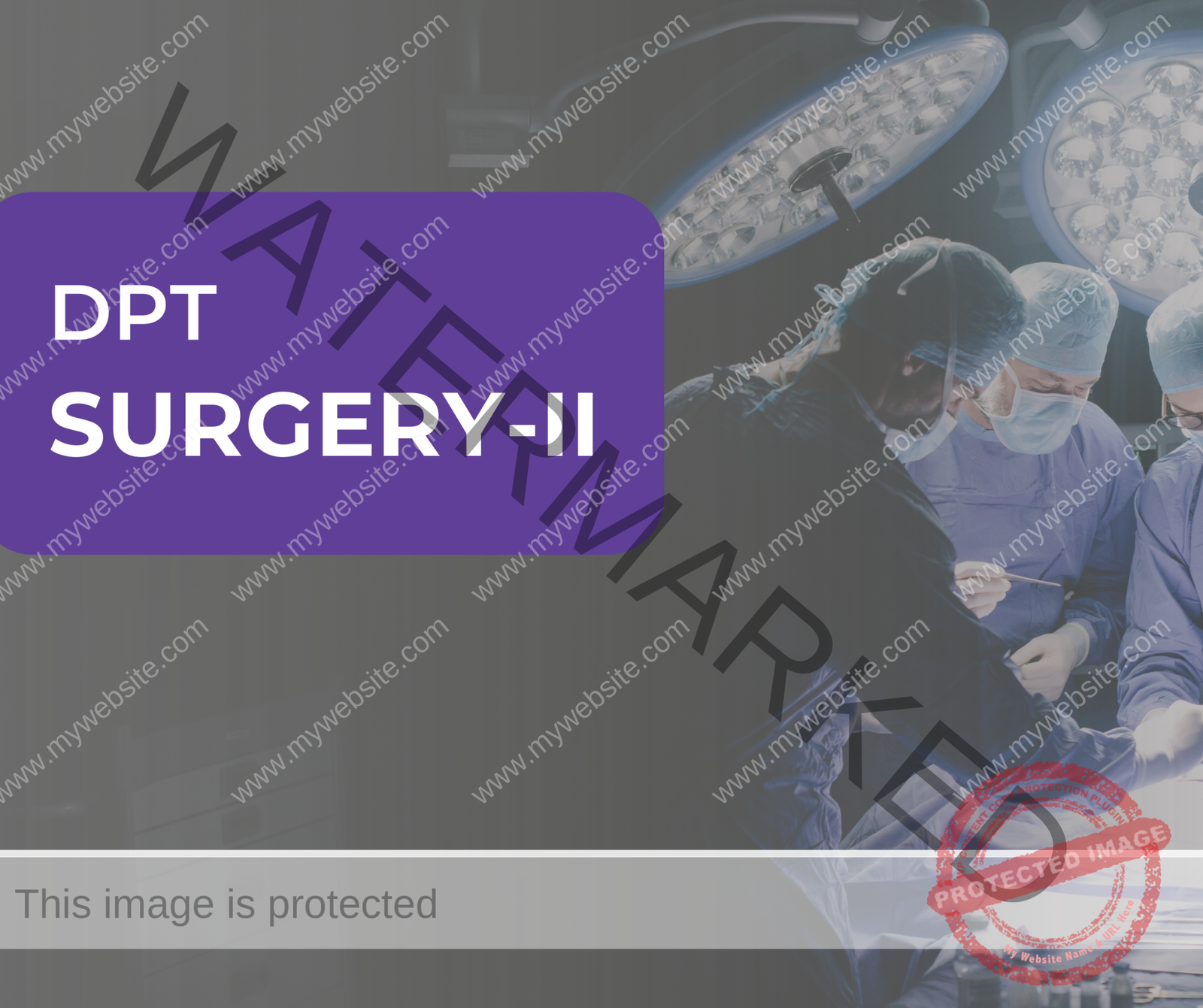DPT – SURGERY II

About Course
DPT – SURGERY II – Complete Exam Preparation
This course covers everything you need for the Surgery II exam in minimal wording, ensuring 100% syllabus coverage in the simplest way possible. It includes topic-wise notes, MCQs, and past papers to help you prepare effectively without wasting time on unnecessary details.
What’s Inside?
✅ Topic-wise notes – Clear, concise, and easy to understand covering 100% of the official syllabus.
✅ MCQs – Practice questions to test your knowledge.
✅ Past Papers – Past paper questions taken from different universities testing this subject.
Topics Covered:
GENERAL SURGERY
o Introduction
o Indications for surgery
o Types of incisions
o Wounds, types of wounds, factors affecting wounds healing, care of wounds
o Bandages and dressing
o Trauma and metabolic response to trauma
o Detailed description of chest and abdominal trauma
o Hemorrhage, hemostasis and blood transfusion
o Classification and brief description of shock
o Fluid and electrolyte balance
o Classification of body fluid changes
o Pre, intra and post operative fluid therapy
o Surgery and diabetes
o Burns and grafts
o Neoplasia
o Preoperative assessment & preparation 178
o Post operative treatment, complications and their management
o Types of anaesthesia
▪ Local anaesthetic agents
▪ Regional anaesthesia (spinal and epidural)
o Intravenous anaesthetic agents
o Muscle relaxants
o Inhalational anaesthetic agents
o Anaesthesia and associated diseases.
o Complications of anaesthesia.
o Perioperative management.
o Cardiopulmonary Resuscitation. CPR.
o Recovery from anaesthesia.
o Pain management and postoperative care.
o Ulcers, sinuses and fistulas
o Transplantation
o Brief description of operation performed on: oesophagus, stomach, intestine
gall bladder, bile duct, spleen, pancreas, liver, abdominal wall, hernias,
breast, kidneys, ureters, prostate, peritoneum, mesentery and
retroperitoneal space
THORACIC SURGERY PULMONARY SURGERY
o Introduction
o types of incision
o types of operation
o complications of pulmonary surgery
o drains , tubes
o pneumonectomy, lobectomy , thoracoplasty
o Operations on pleura
o Chest injuries
o Brief description of indication for pulmonary surgery: 179
o Diseases of chest wall and pleura
o Diseases of bronchi
o Tumors of lung
o Lung abscess
o Hydatid disease of lung
o Pulmonary embolism
o Mediastinal masses
o Problems related to diaphragm
CARDIAC SURGERY
o Introduction
o Cardiorespiratory resuscitation
o Special investigation procedures in cardiac surgery
o Basic techniques in cardiac surgery
o Types of incision
o Types of operation
o Complications of cardiac surgery
o Lines, drains and tubes
o Brief description of indications for cardiac surgery
o Congenital heart disease
o Acquired heart diseases
o Diseases of the pericardium
o Cardiac transplantation
VASCULAR SURGERY
o Introduction
o Investigation in vascular disease types of operation
o Indication for vascular surgery
o Complication of vascular surgery
o Brief description of arterial occlusion 180
o Gangrene
o Detailed description of amputation
o Aneurysm
o Burgers disease
o Raynaud’s disease and syndrome
o Varicose veins
o Superficial and deep venous thrombosis
o Venous hemorrhage
o Lymph edema
o Lymph adenitis and lymphomas
• NEUROSURGERY CRANIAL SURGERY
o Introduction
o Special investigation in brain diseases and traumas
o Types of operations, indications and complications of cranial surgery
o Head injuries to the brain
o Acute intracranial hematomas
o Fractures of the skull
o Intra cranial abscess
o Intracranial tumors
o Intra cranial aneurysm and hydrocephalus
SURGERY OF VERTEBRAL COLUMN SPINAL CORD AND PERIPHERAL NERVES
o Dislocation and management of dislocation of vertebral column
o Tumors of vertebral column
o Prolapse intervertebral disc
o Disc protrusion
o Spondylosis and spondylolisthesis
o Spinal cord injuries and their management 181
o Tumors of spinal cord types of operations performed on nerves
o Nerve injuries and their surgical management
o Brief description of lesions of cranial and spinal nerves and their
management
Course Content
GENERAL SURGERY
-
Introduction – Neoplasia
-
Preoperative assessment & preparation – END
-
Quiz 1
-
Quiz 2
-
Quiz 3